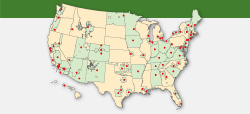Coalitions
"I credit East Bay Clean Cities for providing me a starting place. With their influence, I was able to bring back to the city information about hybrid technology. We looked at all the possibilities for our solid waste collection vehicles and settled on a regenerative braking system. Thanks for your help."

—Fleet Superintendent,
Bob Moulden
City of Manteca, California
Nearly 100 Clean Cities coalitions work to reduce petroleum use in communities across the country. Led by Clean Cities coordinators, coalitions are composed of businesses, fuel providers, vehicle fleets, state and local government agencies, and community organizations. These stakeholders come together to share information and resources, educate the public, help craft public policy, and collaborate on projects that reduce petroleum use.
Making an Impact
More than 228 million people (73% of the total U.S. population) live inside the boundaries of Clean Cities coalitions. Coalitions coordinate the work of more than 10,400 stakeholders nationwide.
Clean Cities coalitions make an impact in their communities every day. Their activities stimulate local economies, facilitate the adoption of new transportation technologies, and make communities cleaner, healthier places to live.
Benefits of Joining
Government agencies and private businesses that sign on as Clean Cities stakeholders gain access to an array of resources, including:
- Networking opportunities with fleets and industry partners that have experience in alternative fuels and advanced vehicles
- Technical training, workshops, and webinars
- Information resources on alternative fuels, advanced vehicles, idle reduction, and other technologies that reduce petroleum use
- Individual consultation and technical assistance
- Funding opportunities from the U.S. Department of Energy
- Information about funding sources from state and local government agencies, nonprofits, and foundations
- Assistance with funding applications
- Public recognition for progress in reducing petroleum consumption
- Assistance with media outreach.

